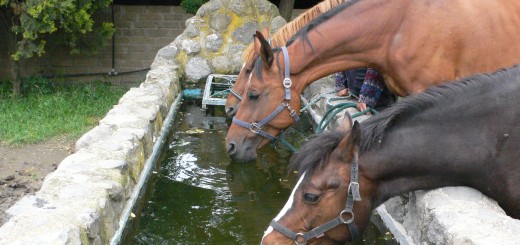A Halachic Query of Jordanian King Abdulla II

Dear King Abdullah,
I’m quite sure you don’t remember me. I was part of a sizable group of Jewish leaders, clergy, politicians and organizational representatives whom you, along with the Center for World Religions, Diplomacy and Conflict Resolution, invited to a gala lunch in a posh Manhattan hotel nine years ago.
To jog your memory, though, I was the fellow with the beard and black hat, and whose lips you may have noticed quietly moving when you entered the room. I was reciting a Jewish blessing that is to be pronounced when one sees a king. It goes “Blessed are You, G-d, Who has given of His glory to flesh and blood.” It is, for obvious reasons, not a common blessing to make, and I was happy to have the occasion to invoke it.
I remember well your address to the crowd. Its essence was your hope that Jews and Muslims might be able, despite political differences, to attain respect for each other’s religious beliefs. Your message was a vision, of a human race unified by its members’ recognition of the worth and dignity of one another. We, you may remember, applauded loudly and enthusiastically.
We learned, too, about how you had undertaken a brave and visionary mission: to marginalize Muslim extremism of the sort that continues to plague the civilized world. You recounted how you had organized a conference of respected religious leaders from all the major schools of Islam to endorse a document that explicitly asserts the responsibility of Muslims to honor “every human being, without distinction of color, race or religion” and to “shun violence and cruelty.” That last phrase particularly has stayed with me, and I recalled it recently.
It was when two Palestinian men, as you surely know, entered a synagogue in western Jerusalem where Jewish men were engrossed in prayer, and mercilessly hacked or shot four of them to death. The attackers killed a police officer who rushed to the scene as well. And as they engaged in their slaughter of innocents, they shouted a declaration of Islamic faith, as so many murderers of Jews have done over recent years, months and weeks. Eventually, police shot and killed the rampaging killers.
Your Parliament’s reaction to this rather striking example of religious “violence and cruelty,” to borrow your phrase, was to observe a moment of silence, in memory… not of the victims but of their murderers. Verses from the Koran (“to glorify their pure souls,” a member of your Parliament helpfully explained) introduced the memorial moment.
Shortly thereafter, according to published reports, your Prime Minister Abdullah Ensour sent a condolence letter to the families of the murderers.
And then, in a broadcast interview, a member of your Parliament, Rudaina Ati, praised “the [Jerusalem synagogue] operation” for sending “a clear message to the Zionist entity…”; and called on Arabs to use violence to “liberate Palestine from the colonialist Jews,” the “filthy Jews [who live] on the land of Palestine.”
All of which leads me to my question. According to Halacha, or Jewish religious law, the blessing that I pronounced when I saw you nine years ago is only proper and only permitted when the monarch one sees has true monarchial power over his subjects, when he is someone whose subjects would not dare stand up in violation of their king’s decrees or initiatives.
The utterance of a Jewish blessing, moreover, which includes G-d’s name, is considered by Halacha to be a very serious matter. One may not pronounce a blessing unless it is truly required. Otherwise it remains a bracha livatalah, a “pointless blessing.”
I have many sins to confess to my Maker, and indeed I recite a confessional prayer daily. My question to you is whether I should include in my confession the sin, even if it was committed unintentionally, of having uttered a bracha livatalah when I saw you nine years ago.
Thank you in advance for your response.
A. Shafran
© 2014 Hamodia



Recent Comments